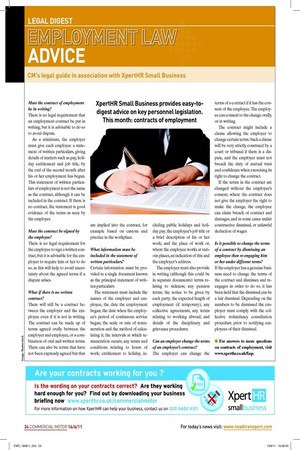XpertHR Small Business provides easy-todigest advice on key personnel legislation.
Page 21

If you've noticed an error in this article please click here to report it so we can fix it.
This month: contracts of employment Must the contract of employment be in writing?
There is no legal requirement that an employment contract be put in writing, but it is advisable to do so to avoid dispute.
As a minimum, the employer must give each employee a statement of written particulars, giving details of matters such as pay, holiday entitlement and job title, by the end of the second month after his or her employment has begun. This statement of written particulars of employment is not the same as the contract, although it can be included in the contract. If there is no contract, the statement is good evidence of the terms as seen by the employer.
Must the contract be signed by the employee?
There is no legal requirement for the employee to sign a written contract, but it is advisable for the employer to require him or her to do so, as this will help to avoid uncertainty about the agreed terms if a dispute arises.
What if there is no written contract?
There will still be a contract between the employer and the employee even if it is not in writing. The contract can be made up of terms agreed orally between the employer and employee, or a combination of oral and written terms. There can also be terms that have not been expressly agreed but that are implied into the contract, for example based on custom and practice in the workplace.
What information must be included in the statement of written particulars?
Certain information must be provided in a single document known as the principal statement of written particulars.
The statement must include the names of the employer and employee; the date the employment began; the date when the employee’s period of continuous service began; the scale or rate of remuneration and the method of calculating it; the intervals at which remuneration occurs; any terms and conditions relating to hours of work; entitlement to holiday, in cluding public holidays and holiday pay; the employee’s job title or a brief description of his or her work; and the place of work or, where the employee works at various places, an indication of this and the employer’s address.
The employer must also provide in writing (although this could be in separate documents): terms relating to sickness; any pension terms; the notice to be given by each party; the expected length of employment (if temporary); any collective agreements; any terms relating to working abroad; and details of the disciplinary and grievance procedures.
Can an employer change the terms of an employee’s contract?
The employer can change the terms of a contract if it has the consent of the employee. The employee can consent to the change orally, or in writing.
The contract might include a clause allowing the employer to change certain terms. Such a clause will be very strictly construed by a court or tribunal if there is a dispute, and the employer must not breach the duty of mutual trust and conidence when exercising its right to change the contract.
If the terms in the contract are changed without the employee’s consent, where the contract does not give the employer the right to make the change, the employee can claim breach of contract and damages, and in some cases unfair constructive dismissal, or unlawful deduction of wages.
Is it possible to change the terms of a contract by dismissing an employee then re-engaging him or her under different terms?
If the employer has a genuine business need to change the terms of the contract and dismisses and reengages in order to do so, it has been held that the dismissal can be a fair dismissal. Depending on the numbers to be dismissed the employer must comply with the collective redundancy consultation procedure prior to notifying employees of their dismissal.
● For answers to more questions on contracts of employment, visit www.xperthr.co.uk/faqs














































